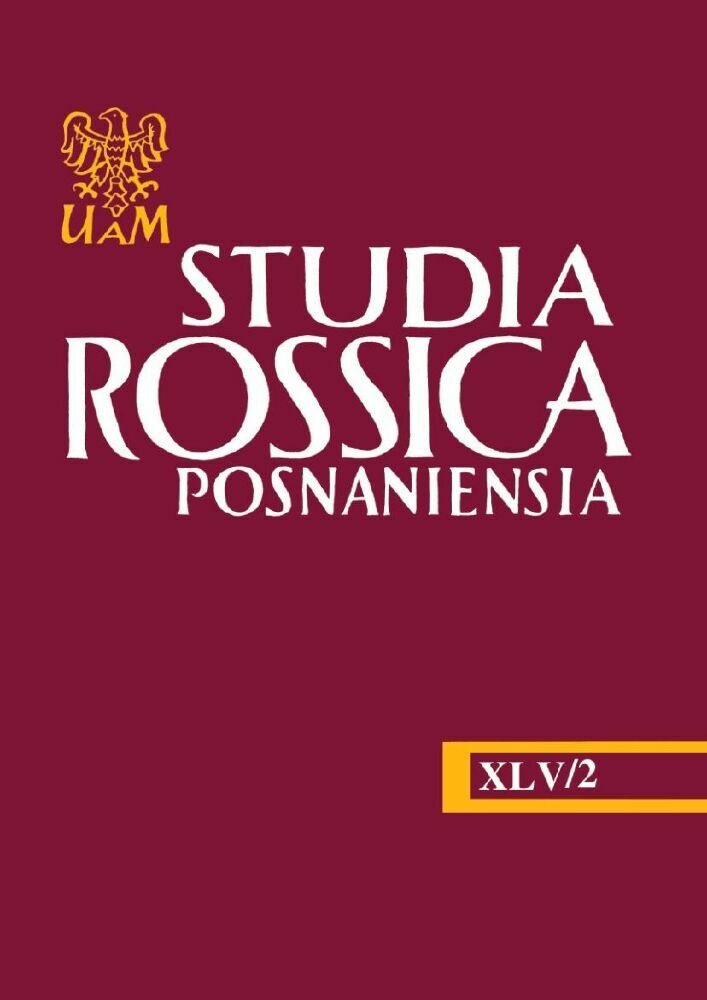Abstrakt
The paper deals with the reception of the Russian character (mind and soul) by two prominent anglophone writers: Virginia Woolf and John Steinbeck. Virginia Woolf recognizes the Russians and their soul through the perception of the great Russian masterpieces of Tolstoy, Dostoevsky, and Chekhov (The Russian Point of View, essay, 1925); Steinbeck’s A Russian Journal, 1948, presents the Russians as they were observed by the American author in their everyday life, rebuilding their country after WWII. The genre specificity of each work, the differences of time, emotions and purpose of writing, the Russian “experience” of each author, determine a certain heterogeneity of understanding of Russia and Russians; nevertheless, both form a heterogeneous whole of the Anglophone perception.
Bibliografia
„America’s Vogue for Things Russian”. New York Times, 19 October 1988, section C, s. 10. Web. 06.09.2019. https://www.nytimes.com/1988/10/19/garden/america-s-vogue-for-things-russian.html.
Beasley, Rebecca. Russomania: Russian Culture and the Creation of British Modernism, 1881–1922. Oxford, Oxford University Press, 2017.
Beasley, Rebecca, Philip Ross Bullock. „Introduction”. Russia in Britain 1880–1940: from Melodrama to Modernism. Red. Rebecca Beasley, Philip Ross Bullock. Oxford, Oxford University Press, 2013, s. 1–18.
Benson, Jackson J. The True Adventures of John Steinbeck, Writer. New York, The Viking Press, 1984.
Bullock, Phillip Ross. „Tsar’s Hall: Russian Music in London 1895–1926”. Russia in Britain, 1880–1940: from Melodrama to Modernism. Red. Rebecca Beasley, Philip Ross Bullock. Oxford, Oxford University Press, 2013, s. 113–128.
Chatterjee, Сhoi, Beth Holmgren, red. American Experience of Russia: Encountering the Enigma, 1917 to the Present. New York–London, Routledge, 2013.
Crankshaw, Edward. Russia and the Russians. New York, The Viking Press, 1948.
Engerman, David C. „Studying Our Nearest Oriental Neighbor: American Scholars and Late Imperial Russia”. American Experience of Russia: Encountering the Enigma, 1917 to the Present. Red. Сhoi Chatterjee, Beth Holmgren. New York–London, Routledge, 2013.
Feuer, Lewis. „American Travelers to the Soviet Union, 1917–1932: The Formation of a Component of New Deal Ideology”. American Quarterly, Summer, 1962.
Glotov, Oleksandr, Nataliâ Kolesnikova. „Džon Stejnbek v ocìncì rosìjs’kogo postradâns’kogo lìteraturoznavstva”. Zarubìžna lìteratura, 7–8, 2006, s. 30–32.
Gumbol’dt, Vil’gel’m fon. Âzyk i filosofiâ kulʹtury. Moskva, Progress, 1985.
Hingley, Ronald. The Russian Mind. New York, Charles Soribner’s Sons, 1977.
Hollander, Paul. Political Pilgrims: Western Intellectuals in Search of the Good Society. New Brunswick–London, Transaction Publishers, 1998.
Holmgren, Beth. „Russia on Their Mind: How Hollywood Pictured the Soviet Front”. American Experience of Russia: Encountering the Enigma, 1917 to the Present. Red. Сhoi Chatterjee, Beth Holmgren. New York–London, Routledge, 2013.
Levontina, Irina. „Pomiloserdujte, bratcy!”. Klûčevye idei russkoj âzykovoj kartiny mira. Red. Anna Zaliznâk, Irina Levontina, Aleksej Shmelev. Moskva, Âzyki slavânskoj kulʹtury, 2005, s. 270–279.
Levontina, Irina. „Slovarnaâ statʹâ «Žalostʹ»”. Novyj obʺâsnitelʹnyj slovarʹ sinonimov russkogo âzyka. Red. Ûrij Apresân. Мoskva, Âzyki slavânskoj kul’tury, 2003, s. 327–331.
Losskij, Nikolaj. Harakter russkogo naroda. Frankfurt am Main, Posev, 1957.
Nicolson, Nigel, Joanne Trautman, red. The Letters of Virginia Woolf. Vol. 3: 1923–1928, letter 1520. San Diego–New York, Harcourt Brace Jovanovich, 1977.
Pozner, Vladimir. „Predislovie”. Džon Stejnbek. Russkij dnevnik. Fotografii Roberta Kapy. Per. Evgenij Kručina. Moskva, Eksmo, 2017, s. 1.
Prohorov, Ûrij, Iosif Sternin. Russkie: kommunikativnoe povedenie. Moskva, Flinta. Nauka, 2006.
Protopopova, Dar’â. Virginia Woolf’s Portraits of Russian Writers. Cambridge, Cambridge Scholars Publishing, 2019.
Protopopova, Dar’â. „Virginia Woolf’s Versions of Russia”. Postgraduate English, issue 13, March 2006, s. 1–32.
Reinhold, Natalya. „Virginia Woolf’s Russian Voyage Out”. Woolf Studies Annual, 9, 2003, s. 1–27.
Rejngol’d, Nataliâ. „Russkaâ tema i obraz Rossii v tvorčestve Virdžinii Vulf”. Rossiâ i russkie v hudožestvennom tvorčestve zarubežnyh pisatelej XVII – načala XX-h vekov. Materialy kruglogo stola v IMLI im. A.M. Gor’kogo RAN (5 dekabrâ 2006 goda). Web. 06.07.2007. http://www.nrgumis.ru/articles/99/.
Rubenstein, Roberta. Virginia Woolf and the Russian Point of View. New York, Palgrave Macmillan, 2009.
Shillinglaw, Susan. „Introduction”. John Steinbeck. A Russian Journal with Photographs by Robert Capa. New York, Penguin, 1999.
Šillinglou, Sʹûzen. „Predislovie”. Džon Stejnbek. Russkij dnevnik. Fotografii Roberta Kapy. Per. Evgenij Kručina. Moskva, Eksmo, 2017, s. 1–7.
Šmelev, Aleksej D. „Leksičeskij sostav russkogo âzyka kak otraženie «russkoj duši»”. Klûčevye idei russkoj âzykovoj kartiny mira. Red. Anna Zaliznâk, Irina Levontina, Aleksej Šmelev. Moskva, Âzyki slavânskoj kulʹtury, 2005, s. 25–38.
Solov’ev, Vladimir. Tajny russkoj duši. Voprosy. Otvety. Versii. Moskva, Russkij âzyk. Kursy, 2001.
Stejnbek, Džon. Russkij dnevnik. Fotografii Roberta Kapy. Per. Evgenij Kručina. Moskva, Eksmo, 2017. Elektronnaâ Biblioteka LoveRead.ec. Web. 07.09.2019. http://loveread.ec/view_global.php?id=61607.
Stepanov, Ûrij. Konstanty. Slovar’ russkoj kul’tury. Opyt issledovaniâ. Moskva, Âzyki russkoj kulʹtury, 1997.
White, William Chapman. These Russians. New York, C. Scribne’s Sons, 1931.
Wierzbicka, Anna. Semantics, Culture, and Cognition. Universal Human Concepts in Culture – Specific Configurations. New York–Oxford, Oxford University Press, 1992.
Woolf, Virginia. „The Russian Point of View”. Web. 23.08.2019. https://ebooks.adelaide.edu.au/w/woolf/virginia/w91c/chapter16.html.
Licencja
PRACE PUBLIKOWANE W CZASOPIŚMIE DOSTĘPNE SĄ NA LICENCJI CREATIVE COMMONS:
Uznanie autorstwa-Użycie niekomercyjne-Na tych samych warunkach 4.0 Międzynarodowe.
Autorzy tekstów przyjętych do publikacji w czasopiśmie „Studia Rossica Posnaniensia” są zobowiązani do wypełnienia, podpisania i odesłania na adres redakcji umowy o udzielenie nieodpłatnej licencji do utworów, z zobowiązaniem do udzielania sublicencji Creative Commons.
Zgodnie z umową, autorzy tekstów opublikowanych w czasopiśmie “Studia Rossica Posnaniensia” udzielają Uniwersytetowi im. Adama Mickiewicza w Poznaniu niewyłącznej i nieodpłatnej licencji oraz zezwalają na użycie sublicencji Attribution-NonCommercial-ShareAlike 4.0 International (CC BY-NC-SA 4.0).
Autorzy zachowują prawa do dalszego, swobodnego rozporządzania utworem.
Autorzy, którzy wykorzystują w swoim tekście cudze utwory (np. ilustracje, fotografie) proszeni są o dostarczenie do redakcji czasopisma zgody na publikację.
Użytkownicy internetu uprawnieni są do korzystania z utworów opublikowanych po 2015 roku “Studia Rossica Posnaniensia” tylko w celach niekomercyjnych, pod następującymi warunkami:
https://creativecommons.org/licenses/by-nc-sa/4.0/
Uniwersytet im. Adama Mickiewicza w Poznaniu zachowuje prawo do czasopisma jako całości (układ, forma graficzna, tytuł, projekt okładki, logo itp.).

